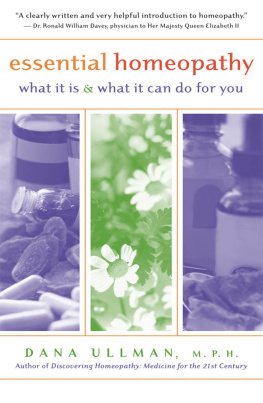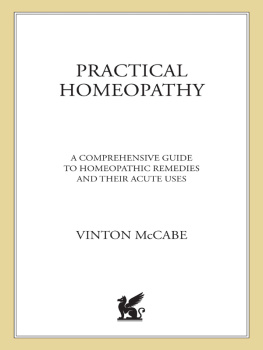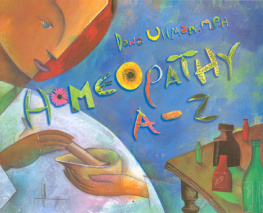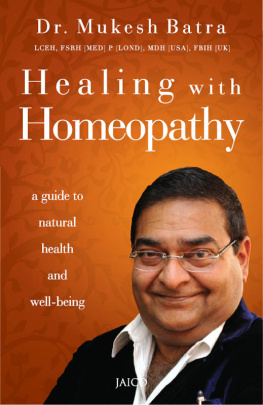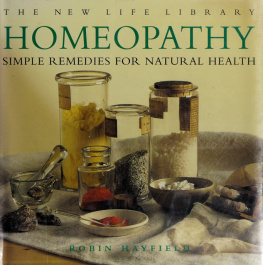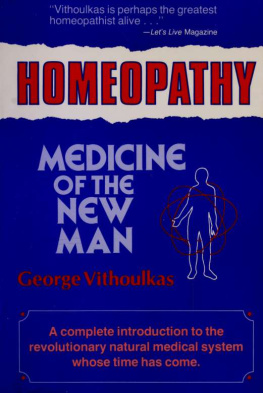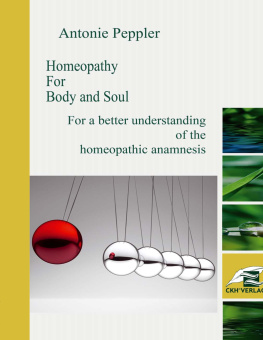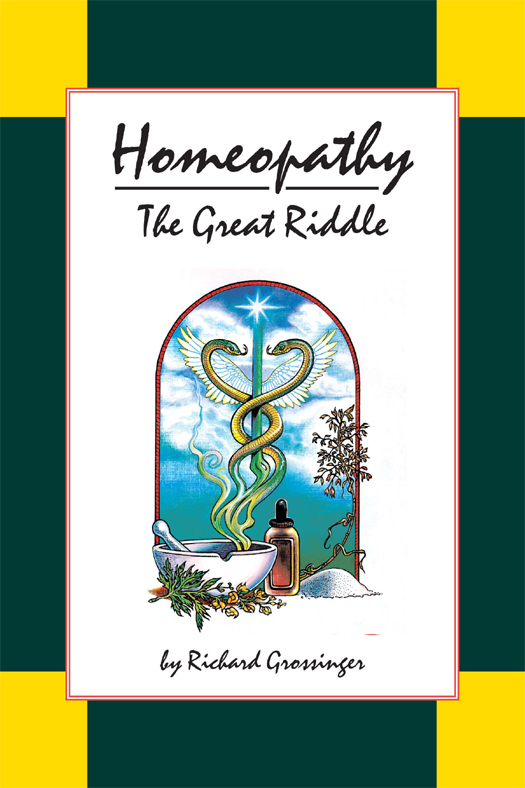Copyright 1980, 1993, 1998 by Richard Grossinger. All rights reserved. No portion of this book, except for brief review, may be reproduced, stored in a retrieval system, or transmitted in any form or by any meanselectronic, mechanical, photocopying, recording, or otherwisewithout written permission of the publisher.
Published by
North Atlantic Books
P.O. Box 12327
Berkeley, California 94712
Cover art by Harry S. Robins
Cover design by Nancy Koerner
Homeopathy: The Great Riddle is sponsored by the Society for the Study of Native Arts and Sciences, a nonprofit educational corporation whose goals are to develop an educational and crosscultural perspective linking various scientific, social, and artistic fields; to nurture a holistic view of arts, sciences, humanities, and healing; and to publish and distribute literature on the relationship of mind, body, and nature.
The Library of Congress has cataloged the printed edition as follows: Grossinger, Richard, 1944
Homeopathy : the great riddle / Richard Grossinger.
p. cm.
Rev. ed. of: Homeopathy : an introduction for skeptics and beginners / Richard Grossinger. 1993.
eISBN: 978-1-58394-699-2
1. Homeopathy. 2. HomeopathyUnited States. 3. Hahnemann,
Samuel, 17551843. I. Title.
RX71.G78 1998
615.532dc20
98-6345
v3.1
Preface to Revised and E-book Edition
Homeopathy is distinguished from mainstream twenty-first-century medicine (allopathy) by its different resolution of each of a series of age-old dichotomies, all of which go back to the birth of human inquiry into disease and healing. Despite the fact that these dichotomies are not in routine professional or public discussion any longer does not mean that they have gone away. In all cases homeopathys allegiance is to the first of the pair:
Diagnosis by holistic motifs and mind-body-spirit patterns as against diagnosis by discrete symptoms or disease categories;
Treating only sick individuals rather than overcoming generic diseases;
Setting treatment on the basis of prior medicinal provings and intuitive characterological readings rather than rational and intellectual explanations of pathological processes or interpretations of laboratory results;
Healing by Similars and matching disease frequencies (even if it means increasing symptoms) as against healing by Contraries and antidoting pathological responses and symptoms;
Stimulating the bodys natural immunity, vital energy, or internal coction as against imposing an external intervention in the form of pharmaceuticals or surgery;
Prescribing activating and aggravating rather than sedating and enervating drugs;
Using information-transferring microdoses rather than activity-transferring macro-substances;
Regarding the body as a mysterious energetic field rather than a concrete chemico-molecular machine;
Viewing diseases as representative of a layering of civilizational latencies, crises, and other suppressed maladies as opposed to chance individual entropic occurrences under thermodynamic, morphogenetic imperatives.
Homeopathy is difficult to pin down and characterize because of disagreements among homeopaths on the following issues:
Whether homeopathy must be practiced immaculately and puristically or whether it can be combined happily with allopathy and/or other vitalistic modalities;
Whether homeopathic cures must be delivered as a single dose of a Simillimum or whether remedies can be more or just as effectively combined;
Whether low-potency doses (less diluted, less succussed, and more resembling conventional allopathic pharmacy) or high-potency doses (more diluted and succussed and energetic) are the benchmarks of reliable homeopathic practice;
Whether wrong remedies, especially in high potencies, are dangerous or just ineffective and harmless;
Whether remedies, once inculcated, continue to be effective or can be antidoted and reversed by coffee, alcohol, dental drills, radiation, and a litany of other culprits;
Whether homeopathy has a conventional biophysical explanation and can (or must) be experimentally explicated or represents a mysterious force and action that only needs to be applied by precedent (without understanding its mechanism) to heal actual sick people;
Whether homeopathy requires a microdose pharmacy or the virtues of its vital rubrics can be transferred without a literal pill in psychic, spiritual, paraphysical, or radionic formats.
This book is the story of these paradoxes and anomalies in the evolution of an enigmatic medical modality.
Preface
There are many books on how to practice homeopathic medicine, its remedies and character types. This book, Homeopathy: The Great Riddle, is an attempt to understand what homeopathy is.
Defining homeopathy is not a simple matter. For one, it has no coherent physical, biochemical, or anatomical theory, at least by modern experimental standards. Homeopathy originates from an historical event at the close of the eighteenth century and has not been definitively reevaluated or updated since. It has rested solely, since then, on its apparent and mystifying success in curing serious and chronic diseases. Meanwhile, its language, science, and philosophy have remained in much the state they were at its inception despite monumental change in the rest of the world.
, The Origins of Homeopathic Medicine, discusses the medical and pharmaceutical systems that preceded homeopathy and from which it assembled its methods and rationales. Without understanding prior systems that are similar to homeopathy, it is difficult to see how homeopathy arrived at its unusual tenets. Notably none of these other systems has survived intact into the present.
The core of this book is , The Principles and Methodology of Homeopathic Medicine. In this section I have summarized the belief system behind homeopathy, pointing out both the ways in which it is convincing and the ways in which it is fantastic and requires a leap of faith. The major premises of homeopathic medicine cannot be concretized; thus, homeopathy must explain itself by a mixture of archaic and futuristic paradigms, ranging from alchemy to chaos theory. My purpose in this chapter is neither to acclaim nor refute homeopathy but to disclose its workings.
reviews the discovery and development of homeopathy by Samuel Hahnemann and explains how the German physician codified a highly unorthodox healing system while fancying he was engaged in mainstream research.
describes homeopathys temporary triumph in nineteenth-century North America, followed by its almost total demise in the early years of the twentieth century, then its revival in the 1970s. The wave of scientific enthusiasm that made homeopathy the supreme American medicine at the time of the Civil War and in the decades thereafter changed direction in the early twentieth century and utterly dashed it. In a startlingly short period of time, homeopathy went from the most progressive and modern medicine known to man to a museum piece. Once laboratory science looked closely at homeopathy, Hahnemanns thesis seemed to unravel into folklore and superstition; it was quickly dismissed. Yet when the counterculture brought new paradigms into society (and healing), homeopathy was mercurially reborn.
Appendices include a case history and a comparison of homeopathy to other alternative and conventional medical systems.


